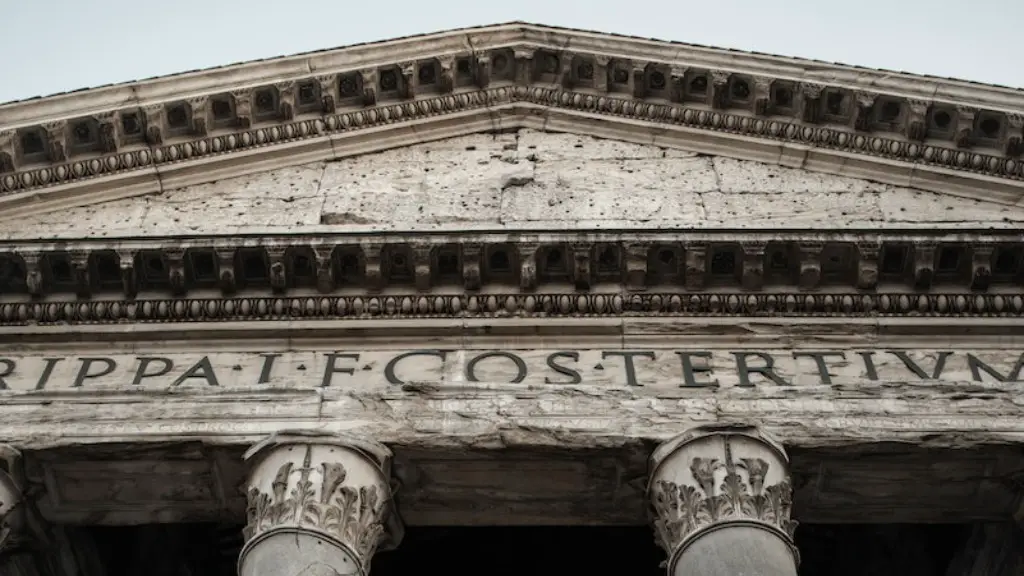Persicution of Christians in Ancient Rome
The persecution of Christians in ancient Rome was an ongoing process which lasted for over three centuries, beginning with the Emperor Nero. The persecution of Christians by the Roman government began in the first century AD, when the Roman Empire was ruled by Nero the Great. The persecution of Christians was not only limited to the Roman Empire but was also a global event, with thousands of Christians being killed in various regions of Europe and Asia.
The main reasons for the persecution of Christians in ancient Rome included the religion’s non-conformity with the polytheistic Roman religion, which was the state religion of the Roman Empire; as well as its tenacious enterprise of proselytizing which was viewed as an act of political sedition by the Roman government, as Christianity was viewed as a new and foreign religion which threatened the status quo. Christians were also viewed as criminals, as they were believed to harbor heretical beliefs, commit immoral acts and oppose the Roman government’s authority.
The persecution of the early Christians was initially carried out by individual Roman citizens, but eventually the Roman government began to get involved. Nero was the first Roman Emperor to launch a systematic persecution of the Christians. However, it was the Emperor Domitian who institutionalized an empire-wide persecution of Christians, creating a policy that required all individuals to demonstrate their allegiance to the Roman gods. Those who refused to comply were arrested and either tortured or executed.
The persecution of Christians in ancient Rome was brutal. Christians were persecuted by being thrown to the lions in the arena, burned alive or crucified. Bible study and worship were banned in public and in private, and any attempt to discuss or practice Christianity was punishable by death. Even after Christianity became the official religion of the Roman Empire, converts were still persecuted, especially those who practiced “heretical” forms of Christianity.
The persecution of Christians in ancient Rome had a profound effect both on the Christians themselves and on Roman society. It created a deep-rooted animosity between Christians and non-Christians, which still exists in some parts of the world today, and it resulted in thousands of deaths. It also caused a major setback for the spread of Christianity, as it made the religion much less attractive to those who were not already believers. It also resulted in much suffering and hardship for those who were persecuted.
Legal Persecution of Christians in Ancient Rome
The legal persecution of Christians in ancient Rome took place over the course of centuries as the Roman Empire changed its state religion several times. The laws which were passed by the Roman Empire to prosecute Christians varied over time, depending on the Emperor at the time. For example, during the reign of Nero, Christians were punished with the confiscation of their property, banishment and even death. However, during the reign of Domitian, the punishment for being found to be a Christian included torture, imprisonment and in some cases, being thrown to the lions.
As Christianity grew and spread, the Roman government began to find it more difficult to persecute Christians as it had done in the past. As the Roman Empire adopted Christianity as its state religion, legislation was passed to protect those who practiced Christianity from legal persecution. Nevertheless, many Christians still were prosecuted for their faith and for other crimes such as treason and sedition.
The legal persecution of Christians culminated in the 4th century, when Christianity became the official religion of the Roman Empire and laws and regulations were passed to promote and protect Christians. These laws protected Christians from legal persecution and provided them greater freedom of worship, but they still faced legal restrictions and punishments for certain acts such as heresy and apostasy.
Political Persecution of Christians in Ancient Rome
The political persecution of Christians in ancient Rome was the result of the polytheistic Roman government’s intolerance of the monotheistic Christian religion. Early Christians were viewed as a threat to the Roman government and its polytheistic religion and were targeted for persecution. This persecution was especially harsh during the era when Christianity was still an illegal religion, and continued after Christianity was made the state religion of the Roman Empire.
The Roman government called for the arrest and torture of Christians for various offences including treason, sedition, heresy, blasphemy and treason against the Roman gods. Many Christians were also persecuted for their refusal to participate in the religious rituals and festivals which were meant to honor the Roman gods. They were accused of apostasy and were subjected to prosecution. There were also instances in which Christians were persecuted for no reason at all and were simply targeted because of their faith.
Though the persecution of Christians in ancient Rome was brutal, it did not break the Christian faith. In fact, it only strengthened it and resulted in the spread of Christianity throughout the Roman Empire and beyond. Despite the suffering and loss of many innocent lives, early Christians remained steadfast in their faith and kept their faith alive for future generations.
Religious Persecution of Christians in Ancient Rome
Religious persecution of Christians in ancient Rome took place mainly because of Christians’ refusal to comply with the demands of the polytheistic Roman religion. This persecution was especially acute during the times when Christianity was an illegal religion, but it did not stop after Christianity became the state religion of the Roman Empire. This religious persecution included laws and regulations aimed at regulating and suppressing Christian practices.
The Romans punished those who refused to comply with their religious mandates, whether it was refusing to make sacrifice to the Roman gods or refusing to recognize them as gods. Christians were forced to perform acts which went against their beliefs and teachings, and were humiliated and sometimes even arrested or tortured for their refusal. The religious persecution of Christians in ancient Rome was ultimately a tool used by the government to suppress and control the spread of Christianity.
Despite the harsh punishments, many early Christians were determined to remain true to their faith. They were willing to accept the persecution and even death in order to stay faithful to their religion and beliefs. This steadfast commitment to their faith is what enabled Christianity to eventually become the state religion of the Roman Empire and to spread throughout the world.
Cultural Persecution of Christians in Ancient Rome
The cultural persecution of Christians in ancient Rome was a result of their non-conformity with the polytheistic Roman culture and its customs. Early Christians were regarded as outsiders and were often subjected to ridicule and scorn. They were viewed with suspicion and were accused of being heretics or disloyal to the Roman Empire.
Early Christians were ostracized and could not participate in many of the activities which the Romans enjoyed, such as participating in the civic, athletic, religious and cultural ceremonies and festivals which celebrated the gods of the Roman pantheon. These activities played an important role in the Roman Empire and its culture, so anyone who refused to participate was viewed as an outsider who had no knowledge of or respect for the traditions of the Roman Empire.
The cultural persecution of Christians in ancient Rome was part of a larger cultural conflict between the Christians and the non-Christians of the Roman Empire. This conflict not only resulted in the persecution of the Christians, but also in the spread of their faith and beliefs beyond the confines of the Roman Empire. This cultural conflict was ultimately the catalyst for the spread of Christianity and its eventual dominance in the Roman Empire.
Social Persecution of Christians in Ancient Rome
The social persecution of Christians in ancient Rome was mainly due to their refusal to conform to the customs and traditions of the Roman society. Christians were sometimes viewed as selfish and immoral because they refused to participate in activities such as sacrificing to the gods, participating in the public festivals or consuming alcohol. This was perceived as a threat to the social order, and as a result, Christians were persecuted and isolated by their non-Christian peers.
Social persecution of Christians also included being barred from certain professions or joining certain associations and clubs. Christians were often denied access to certain places and activities and were sometimes subject to public humiliation or punishment. This social exclusion caused a great deal of suffering and hardship for many early Christians, and it also hindered their efforts to spread the Gospel.
The social persecution of Christians was one of the main factors which eventually led to their acceptance in the Roman Empire. Eventually, their faith and beliefs gained more acceptance among the populace, and Christians were able to spread their message without fear of persecution and without the stigma of being perceived as outsiders.




